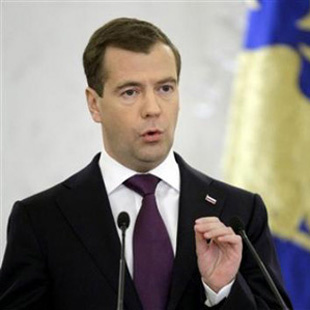Bashar at the Point of “No-Substantial-Reforms”

 During his visit to the Ukrainian City of Odessa on Thursday, Russian FM Sergei Lavrov reiterated that the situation in Syria is an internal affair which will only be aggravated if internationalized by foreign countries. Mahmoud Shouri, Russian affairs analyst, believes that even with Moscow’s support, Bashar will have tough days to pass:
During his visit to the Ukrainian City of Odessa on Thursday, Russian FM Sergei Lavrov reiterated that the situation in Syria is an internal affair which will only be aggravated if internationalized by foreign countries. Mahmoud Shouri, Russian affairs analyst, believes that even with Moscow’s support, Bashar will have tough days to pass:
IRD: Mr. Shouri, there are reports about an agreement between Russia and the West over Syria after the latest G8 meeting in Deauville, France.
MS: As you might have heard, at the end of the G8 summit in France, Russian President Dmitri Medvedev called for the Libyan dictator Muammar Qaddafi to step aside. Some analysts interpreted his remarks as a sign of a trade-off between Russia and the Western countries; that is, Syria would remain immune from EU and US pressure in return for Moscow turning neutral towards NATO attacks on Libya.
IRD: Russian Foreign Minister Sergei Lavrov warned on Thursday that any foreign intervention in Syria can destabilize the entire Middle East. How serious was his warning?
MS: Syria is no doubt a crucial foothold for the Russians and the key to their Middle Eastern sphere of influence. Russia will most likely veto any upcoming UN Security Council resolutions against Syria. They did not do it for Tehran, but they will do it for Damascus.
IRD: So tension between Russia and Western countries over Syria is foreseeable.
MS: So far, Western countries have tried to cajole Russia or have quit before submitting any draft resolutions in the Security Council. However, the West may try to show mettle against the Russians and submit a draft resolution, while risking Moscow’s adverse vote.
IRD: Lavrov has also voiced support for implementation of reforms in Syria. How effective will the likely pressures by the Kremlin on Syrian leaders be?
MS: Syria’s allies, including Iran and Hezbollah, have also called for reforms in Syria. Moscow is also willing to see pressures on Damascus defused by enforcement of reform plans. But Syria is now at a point where even major reforms may fail to produce the desired effects.
IRD: Why?
MS: Because at this point, substantial reforms will be interpreted by the opposition as a sign of Bashar’s fragility. One step backward by Assad means one step forward for his opponents. Reforms, if any, will be cosmetic.

